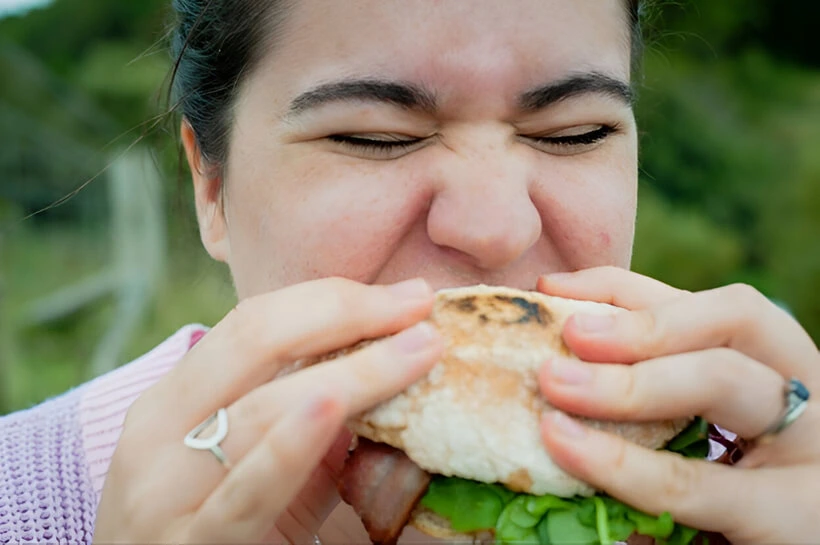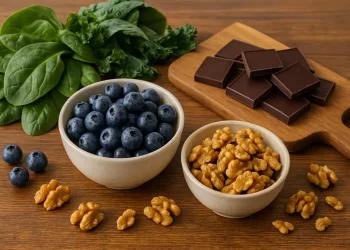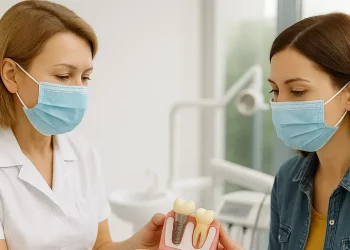Teenagers often carry a quiet weight. Two lives run in parallel: the version of themselves that the world sees, and then the one that surfaces when the lights are off and no one’s watching. When emotions swell and coping tools run thin, food can become more than just sustenance. It becomes a way to feel less. Not out of hunger, but from overwhelm. That’s binge eating. And it’s far more common than most people assume.
At dinner, everything may look normal. Conversations happen, plates get cleared. But later, when the house quiets down, another kind of eating begins. It’s fast, it’s hidden, and it often ends in a haze of shame. The wrappers are tucked away. The guilt kicks in. A promise to “never do that again” follows, though it rarely holds. The most painful part? The loneliness.
So what’s really going on here? Why does this happen, and why don’t teens talk about it?
If you or someone you know is struggling, call Kiran Mental Health Helpline at 1800-599-0019 or Childline at 1098. For urgent risk, contact local emergency services immediately.
Why Teens Keep It Hidden
The short answer is shame. A kind that’s hard to explain and even harder to shake. From a young age, teens are told to “eat healthy,” to “control cravings,” to look a certain way. So when their eating feels out of control, they blame themselves. They feel embarrassed, weak, maybe even a bit broken. The fear of being judged looms large.
And then there’s the stereotype problem. Eating disorders are still too often framed as something that only happens to underweight girls. But binge eating doesn’t care about body size, gender, or how many sports someone plays. It slips under the radar precisely because it doesn’t always come with dramatic weight changes or visible signs.
Most teens dealing with this aren’t looking for attention. They’re trying, quietly, to survive.
The Triggers Behind the Silence
Binge eating, at its core, isn’t really about food. It’s about emotion. And for teenagers, emotion can come crashing down from many directions.
- Social Media Pressure
Every scroll reveals a world of filtered bodies and curated meals. Even the “messy” posts are polished. Teens compare their full, chaotic lives to these cropped snapshots, and the gap can be crushing. Food becomes a release valve.
- Bullying and Isolation
Some teens carry wounds no one sees. Bullying at school, feeling like an outsider, and being misunderstood. Food, in those moments, isn’t about pleasure. It’s about numbness.
- Academic and Family Pressure
The pressure to perform, get the grades, prep for college, and live up to expectations can feel suffocating. In a world that seems chaotic, eating in secret can feel like the one thing they can control. In some cases, seeking care from licensed child and adolescent mental health programs often helps when clinically appropriate.
How Guilt Locks Them In
The aftermath of a binge isn’t just physical. It’s emotional. Many teens feel disgusted with themselves. They might skip meals the next day, swear off snacks, or promise to “get serious” about dieting. But emotional pressure doesn’t just go away. Eventually, the stress builds back up. And the cycle repeats:
- Stress rises
- Food becomes the outlet
- Guilt sets in
- Restriction follows
- Stress returns
This loop can continue for months, even years, without anyone realizing what’s happening.
If this feels familiar, you’re not alone. Support from evidence-based recovery programs may help teens build healthier ways to cope and understand the patterns behind their eating behaviors.
Subtle Signs a Teen Is Struggling
Most teens won’t say, “I binge eat.” But their behavior might hint at it:
- Large amounts of food are disappearing quickly
- Hidden wrappers or secret stashes
- Eating very little during the day, then binging later
- Mood swings tied to eating
- Avoiding meals with family or friends
- Preoccupation with body image
- Patterns of skipping meals, then overindulging
Sometimes, it’s not even about the food. You might notice food disappearing quickly or a teen who constantly avoids breakfast. If something feels off, trust your instinct.
If you suspect something’s going on, don’t confront or accuse. Try something simple, like: “You’ve seemed a little overwhelmed lately. Want to talk?” The key isn’t pressure, it’s presence.
What Actually Helps
This isn’t about willpower. It’s about pain. You can’t fix binge eating by lecturing about food choices or handing out diet tips. What teens need is space. An emotional safety to figure out what’s really going on beneath the surface.
Be the Safe Place
Let them talk. Don’t rush to solve anything. Just listen. Validation. “I get why this is hard” can do more than advice ever will.
Connect Them with Real Help
Support from qualified therapists or youth-focused services may help, especially when care is guided by trained clinicians. Specialized residential programs for adolescents can be helpful when a structured environment is necessary.
Change the Atmosphere at Home
No diet talk. No comments about weight. Keep meals regular and low-pressure. Focus on rest, kindness, and creating a home where it’s okay to be honest about difficult emotions.
Final Thoughts
Teen binge eating isn’t about laziness, lack of discipline, or seeking attention. It’s about hurt. And trying to quiet that hurt. The silence around it only feeds the shame, but real healing begins when someone says, “I see you. I’m here.”
So if you’re a parent, a teacher, or someone who cares, you don’t need all the answers. You just need to stay.
Sources:
- National Institute for Health and Care Excellence (NICE). (2020). Eating Disorders: Recognition and Treatment.
- American Academy of Pediatrics. (2021). Clinical Report on Eating Disorders in Adolescents.
- Journal of Adolescent Health. (2020). Evidence-Based Interventions for Eating Disorders in Youth.
Important Legal and Medical Disclaimer
This article is intended solely for general informational and educational purposes related to teen binge eating and emotional wellbeing. It is not medical advice, diagnosis, or treatment, and should not replace consultation with a qualified healthcare professional. WellHealthOrganic.com and its authors are not doctors or licensed medical advisors. Readers are strongly encouraged to seek professional help from licensed and qualified mental health professionals for accurate diagnosis and personalized care.
Mental health conditions vary widely between individuals, and recovery outcomes depend on many personal and clinical factors. Any examples of care approaches or references to clinics, programs, or professionals in this article are provided for contextual or educational reference only.
WellHealthOrganic.com has not verified, endorsed, or recommended any specific clinic, practitioner, or service provider mentioned or implied herein. We make no guarantees regarding the quality, availability, or results of any third-party services or organizations. Readers are solely responsible for independently verifying the credentials, licensing, and legitimacy of any healthcare provider before pursuing consultation or treatment.
Here we have mentioned: “If you or someone you know is in distress, you may contact the Kiran Mental Health Helpline (1800-599-0019) or Childline (1098) in India for general assistance.”
However, WellHealthOrganic.com, its authors, or administrators have not independently verified these helplines and are not responsible for their availability, accuracy, or the quality of any assistance provided. If you do not receive proper help or response, we are not liable for the outcome or consequences of any external organization, service, or action.
In a life-threatening emergency, contact your local emergency services immediately.
All images used in this article are for illustrative reference only. They do not depict real patients, doctors, clinics, or actual treatment scenarios, and should not be interpreted as endorsements or factual representations.
By reading or acting upon this article, you agree that all health-related decisions are made at your own discretion, and WellHealthOrganic.com, its writers, contributors, and affiliates shall not be held liable for any loss, harm, or consequence arising from reliance on this content.
Any external website links, if provided, are for additional reading only and do not constitute an endorsement or recommendation. We do not guarantee the accuracy, safety, or reliability of external content.



















